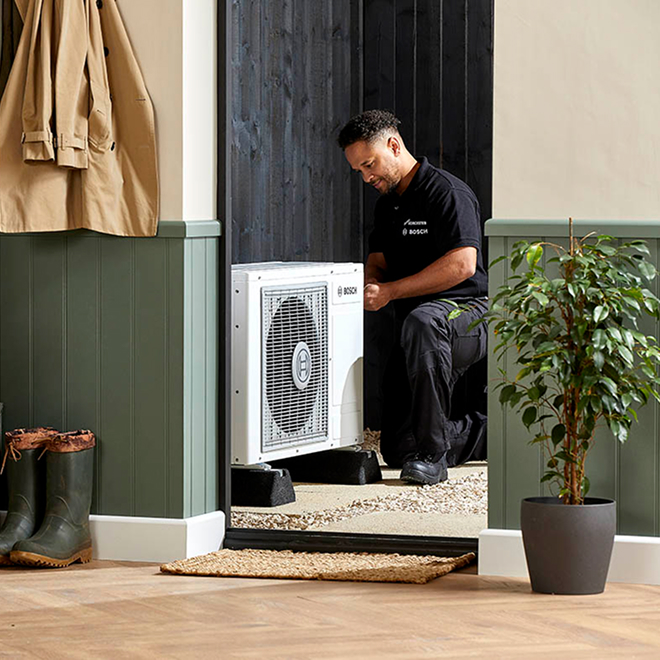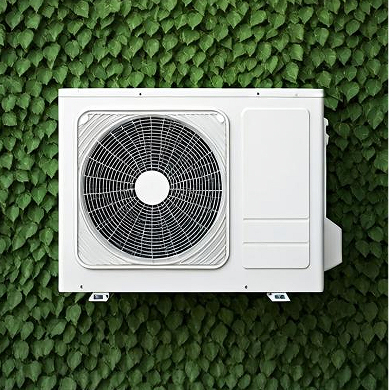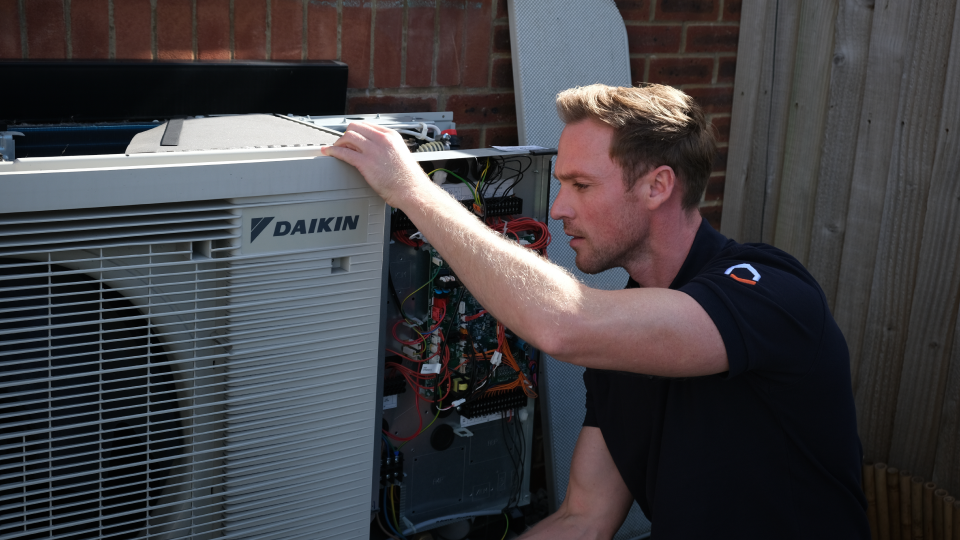The way we heat, power, and run our homes is changing. With energy prices unpredictable and climate goals on the horizon, homeowners are actively looking for solutions that don’t just work today, but will also stand the test of time.
Air Source Heat Pumps (ASHPs) are leading the charge but they’re not the full picture. They’re just the start of the story for the foundation of homes that are efficient, resilient, and ready for the decades ahead.
Learn how air source heat pumps fit into the bigger picture of sustainable living -opening the door to smarter, cleaner, and more resilient homes.

Why heat pumps matter for the future of our homes
Air source heat pumps are already proving to be a smarter alternative to traditional gas or oil boilers. For example:
- High energy efficiency: ASHPs can deliver 3 – 4 times more heat than the electricity they consume, which is going to significantly lower energy bills compared to conventional heating methods.
- Carbon reduction: they use renewable energy from ambient air (especially when powered by the UK’s increasingly green electricity grid), which drastically reduces emissions and minimises the reliance on fossil fuels. When paired with renewable electricity sources, their environmental impact is even lower.
- Year-round comfort: many systems offer both heating and cooling, ensuring comfort regardless of the season.
The other key thing to note is that a well-installed, regularly serviced heat pump will ensure you keep those efficiency and carbon savings year after year – making it a real future-proof investment.
Beyond heat pumps – the whole picture
Installing a heat pump is just one step towards a sustainable, future-ready home.
To truly futureproof your home, combine ASHPs with other innovative technologies:
- Smart thermostats and home automation: smart heating controls and AI-powered systems optimise your comfort and energy usage automatically – crucial for managing today’s grid demands and rising energy costs. These devices learn your daily routine and adjust temperatures automatically, saving energy without you needing to fiddle and faff with settings.
- Solar panels and battery storage: pairing heat pumps with solar panels and advanced storage systems means your heat pump can run on power straight from your roof, with AI-driven energy management for full control.
- Enhanced building materials: a well-insulated home – like timber frames and deeper insulation – keeps the heat where you want it and ensures your home stays energy-efficient for decades.
- Electric vehicle (EV) charging and efficient appliances: integrating EV charging solutions and using modern, energy-rated appliances will extend sustainable living beyond heating.
- Smart ventilation and air quality: advanced ventilation systems help maintain a healthy indoor environment while reducing energy loss.
Each of these systems performs best when your heat pump is running as it should, and that’s where regular servicing and proactive maintenance play such a critical role to ensure this keeps happening.
What about colder climates?
There’s a common myth that heat pumps don’t work well in colder climates. In reality, modern systems can operate efficiently even when outdoor temperatures drop as low as –15°C.
Look at countries with far harsher winters than the UK that rely heavily on heat pumps. The real key to performance here is proper sizing, good insulation, and yes – keeping the system maintained so it continues working at peak efficiency.
What’s driving the change for the future?
The shift towards future-proof homes isn’t just about choice – it’s also being driven by change at the national level:
- Future homes standard 2025: from this year, new homes will be built without gas boilers, using low-carbon heating like heat pumps instead.
- Boiler upgrade scheme: grants of up to £7,500 make switching more affordable.
- Energy independence: with less reliance on gas imports, heat pumps protect households from volatile fossil fuel prices.
- Boosting property value: homes with strong EPC ratings are more likely to attract to buyers and tenants.
Creating resilient, connected homes
Smart technology is reshaping how homes manage their energy use, and while people are very sceptical about the implications of AI, there’s really nothing to be afraid of because the move toward ASHPs is part of a broader shift:
- Homes are evolving into integrated ecosystems that coordinate heating, power, air quality, security, and lifestyle needs. Being able to predict when to use more or less energy is at your fingertips.
- Automation and AI are key for this real-time optimisation – reducing emissions, saving money, and adapting to changing conditions. You can use it to reduce costs by avoiding peak electricity times.
- This tech can send reminders when a service check is due – or spot a fault before it becomes a much bigger issue.
- Government incentives and building standards are accelerating the adoption of these technologies, ensuring new homes are ready for the decades ahead.
By installing an air source heat pump, you’re opening the door to these wider future-proofing upgrades, setting the foundation for a home that’s not just sustainable – but smarter, cleaner, and more resilient to whatever challenges the future brings.
Air source heat pumps vs. biomass boilers
- Efficiency: modern ASHPs can achieve efficiencies (COP) of 300-400% (i.e., 3 – 4 units of heat per unit of electricity consumed). Biomass boilers typically have 80 – 90% efficiency due to heat loss in burning wood or pellets.
- Fuel & maintenance: biomass boilers require ongoing sourcing, storage, and delivery of wood products and regular cleaning; ASHPs only use electricity and need less maintenance.
- Environmental impact: both options are renewable, but ASHPs do not rely on combustion and are considered ‘net zero’ when powered by renewable energy, while biomass is low carbon if sustainably sourced.
Summary table (for those of you who like the detail):
| Option | Efficiency | Upfront Cost | Maintenance | Space Needed | Main Limitations |
|---|---|---|---|---|---|
| Air Source Heat Pump | 200–400% | Low–Medium | Low | Minimal outdoor | Less efficient in very cold climates |
| Ground Source HP | 300–450% | High | Low | Large outdoor | Expensive, disruptive install |
| Solar Thermal | 70–90% | Medium | Low | Roof/external | Weather dependence, hot water only |
| Biomass Boiler | 80–90% | Medium–High | Medium–High | Fuel storage | Manual fuel, emissions from burning |
ASHPs offer the best balance for most homes with high efficiency, low maintenance, and more flexibility. However, ground source heat pumps or smart combinations with solar or biomass can suit specific site needs for maximum sustainability and cost-effectiveness.
Air source heat pumps are more than just a replacement for gas boilers – they’re the starting point for homes that are cleaner, smarter, and more resilient. For their best performance – while building confidently on top of them with smart tech, solar, or storage – regular servicing is essential.
At ServiceMy, we specialise in keeping air source heat pumps running efficiently with service plans, emergency call-outs, and fault reporting. It’s how we help homeowners protect their investment, cut carbon, and prepare their homes for the future.
Talk to us today about a tailored service plan – and take the next step in future-proofing your home.
Schedule Your Heat Pump Service Today
Don’t wait until efficiency drops, or your pump encounters issues. Investing in routine maintenance for your air source heat pump is the best way to keep your household energy-efficient, cosy, and cost-effective year-round.
Get in touch with our professional servicing team today to schedule your appointment. With extensive experience in heat pump servicing and home energy solutions, we’re here to help you stay warm, save money, and protect your investment.
Maintain your heat pump, and it will reward you with years of efficient and reliable performance!


